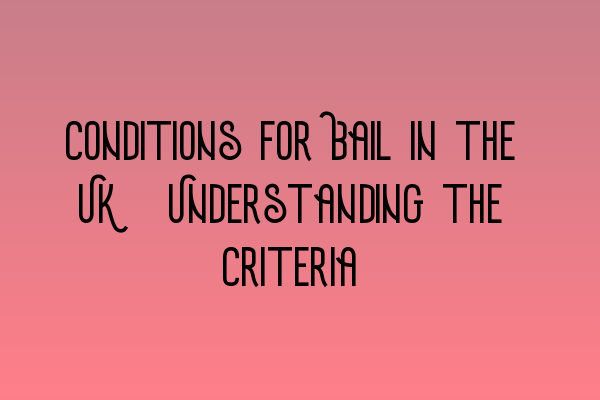Conditions for Bail in the UK: Understanding the Criteria
Introduction
When it comes to criminal law in the UK, one crucial aspect that often comes into play is bail. Bail represents a temporary release of a person accused of a crime, subject to certain conditions and guarantees. Understanding the criteria for bail is essential for both legal professionals and defendants.
The Purpose of Bail
The primary purpose of granting bail is to strike a balance between the interests of individuals accused of crimes and public safety. The court aims to ensure that individuals are not unduly detained before their trial, while also minimizing the risk of further offenses and promoting the administration of justice.
Criteria for Bail
When determining whether to grant bail, the court assesses various factors. Let’s delve into the key criteria considered:
1. Risk of Flight
The court evaluates the likelihood of the defendant absconding before their trial. Factors such as ties to the community, employment, family support, and previous compliance with bail conditions play a vital role in this assessment.
2. Risk of Reoffending
The court assesses whether releasing the defendant on bail poses a risk of them committing further offenses. Previous criminal record, severity of the alleged crime, and any history of violence are taken into account to determine this risk.
3. Public Safety Concerns
The court considers the impact of releasing the accused on public safety. This assessment particularly focuses on whether the defendant poses a danger to specific individuals or the general public. It may also involve assessing the potential for interference with witnesses or the criminal justice process.
4. Nature and Severity of the Offense
The seriousness of the alleged crime is an important consideration for granting bail. More severe offenses may lead to a higher probability of remand in custody, as they may involve potential lengthy prison sentences.
5. Social Factors
Social factors, such as the defendant’s age, mental health conditions, and vulnerability, may also influence the court’s decision on bail. In some cases, the court may impose specific conditions to address these factors while ensuring the defendant’s appearance at trial.
Conditions of Bail
If the court grants bail, it will typically impose conditions to ensure compliance and address any concerns. These conditions may include:
- Regular reporting to a police station
- Surrendering a passport or travel documents
- Restrictions on leaving a specific geographical area
- Abstaining from contacting certain individuals
- Curfews and restrictions on movement
- Refraining from participating in specific activities
- Posting a bail bond or surety
Conclusion
Understanding the criteria for bail in the UK is crucial for both legal professionals and defendants. By evaluating factors such as the risk of flight, risk of reoffending, public safety concerns, nature and severity of the offense, and social factors, the court can make an informed decision regarding bail. Additionally, complying with the conditions of bail is essential to ensure the temporary release is maintained. To prepare for criminal law and practice examinations, consider exploring our related articles:
